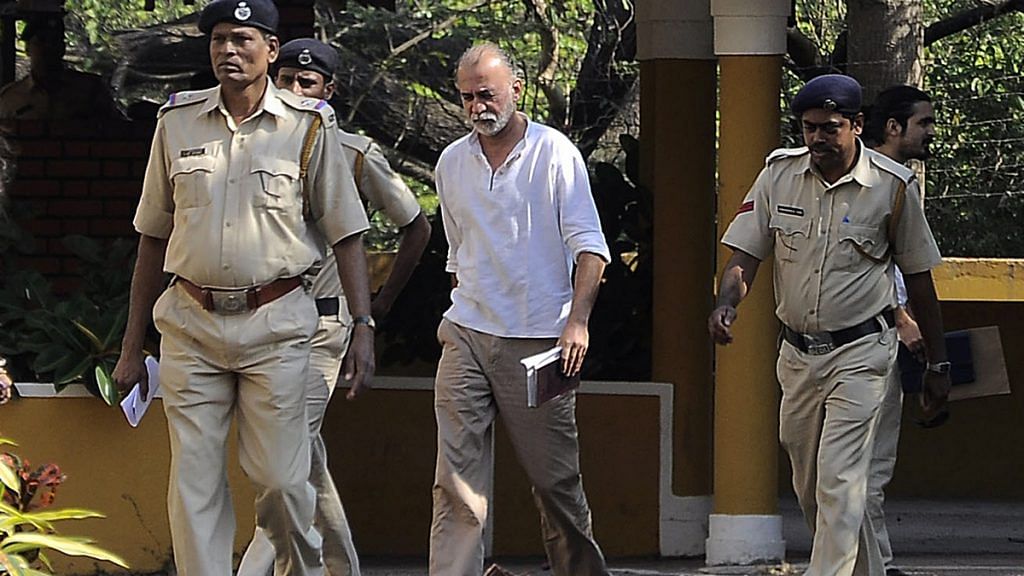Five years after Tejpal was booked, he manages to keep stalling the case. No wonder women are disillusioned with the due process.
The raging #MeToo movement in India has many problems with it, just as it has been problematic in the US and elsewhere. The biggest problem is that it seeks to name and shame, destroy reputation and careers, without a due process.
The absence of a due legal process makes it open to misuse, and then there’s distinction denial. From an uncomfortable proposition to a rape, everything seems to be clubbed together. The punishment seems to be the same. It’s all getting muddled, and there seem to be more questions than answers.
Yet, it’s unfair to blame #MeToo for undermining due process because the due process has been undermined by the law itself. The law, as they say, is an ass.
Also read: #MeToo in India should not forgive women who enable patriarchy and rape culture
After the turning point of Nirbhaya in December 2012, everyone including the judiciary agreed there was a need for speedy justice in cases of rape. Laws pertaining to sexual harassment were strengthened. The Supreme Court’s Vishakha guidelines were formalised into a law on sexual harassment at workplace.
With lawyers like Tejpal’s
And yet, for all this movement, the system is still stacked against survivors. On 30 November 2013, Tehelka editor Tarun Tejpal was arrested on charges of rape. Five years later, the trial in his case continues to be stalled. His army of high-profile lawyers manage to get the trial proceedings stalled for long periods by filing all sorts of applications.
Five long years later, Tarun Tejpal continues to game the system. It was only in 2017 that charges were formally framed in a Goa court. As recently as last month, the Supreme Court again stayed the proceedings in the trial court until 30 October.
Justice in the Tejpal case has been reduced to a farce. Tareekh pe tareekh, as the famous Bollywood dialogue goes. If this is how the law works in a high-profile case that caused public outrage, you can imagine what it must be like in nondescript cases.
Long before the #MeToo campaign, a woman journalist at Tehelka had the courage to speak up against a powerful editor. The law lets her down when the Supreme Court agrees to listen to Tejpal’s influential lawyers and grants a stay in the Goa trial court hearing. This is how serious the law is about giving justice to a woman whose bodily integrity was allegedly violated by a man in position of power.
Other women in the media see the incredible and inordinate delays in the Tejpal rape case, and it makes them cynical about the due process. There have been rape cases where judges have made unfortunate statements like ‘no can mean yes’. Fast-track courts remain vulnerable to being slowed down if the accused can hire fancy lawyers.
#MeToo is a legal emergency
Can you blame women for not trusting the due process? The legal procedure here becomes a punishment for the woman accuser.
We all need the due process – but does it even work? Taking legal recourse seems to be a greater punishment. If you are a man wrongly accused and defamed in #MeToo, you will think a hundred times before filing a defamation case. We all know the case won’t go anywhere, will only compound your trauma, will only make you run around the courts with tareekh pe tareekh, and cost you precious time and money.
Also read: #MeToo movement should not spare Indian NGO heroes and I am speaking out
It’s the same with women who are sexually harassed and assaulted. If #MeToo seems like mob justice, let it be a lesson on how we all need the due process to work. Let #MeToo make us all demand that the due process be fixed. Let us begin with the Tarun Tejpal case. If he’s not guilty, he deserves to be declared innocent pronto. Why do his lawyers keep running to the courts to delay the trial? Why does the Supreme Court keep agreeing to this demand?
The government, police and judiciary should all treat #MeToo as a legal emergency in India. #MeToo is only the symptom of the virus in the body politic of the law.
Does the ICC mechanism inspire confidence?
Do the internal complaints committees (ICC) of party organisations really work? How many organisations, whether they are into news media or politics or Bollywood, actually have ICCs? Is anyone doing an audit? Do employees feel empowered to go to the ICC with a compliant? Do they feel they’d be heard fairly? Or, will they be penalised for daring to speak up against a powerful male boss?
Many organisations deal with the ICC requirement as just paperwork for legal compliance. If the ICC mechanism doesn’t inspire confidence among women, they will eventually send a message to a #MeToo champion one day with an office story from many years ago. Naming and shaming will happen. It’s because that’s the only recourse the due process left her with. If the due process fails us, it will lead to an ‘undue’ process like #MeToo.
Those championing #MeToo are not against the due process. They want it too. Except, it’s not there. The frustration with the absence of laws that actually deliver justice is such that #MeToo champions have come up with their own due process. They want women to identify themselves to other women so that there is some filter, and there may be some cross-questioning before a story is put out. This shows the internal reflection within #MeToo because obviously women also realise the problems with it.
Also read: India’s MeToo will succeed if our laws catch up with it
#MeToo is a loud scream for India to fix its due process. Governments and courts alike need to listen.
(This is an updated version of the piece)
